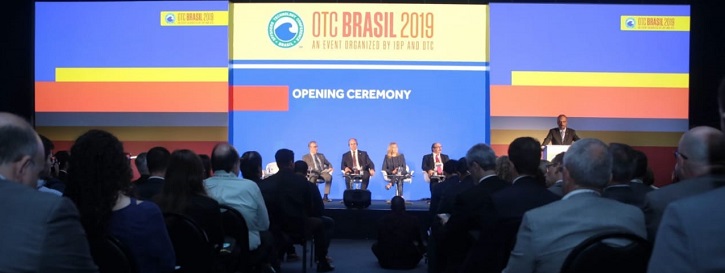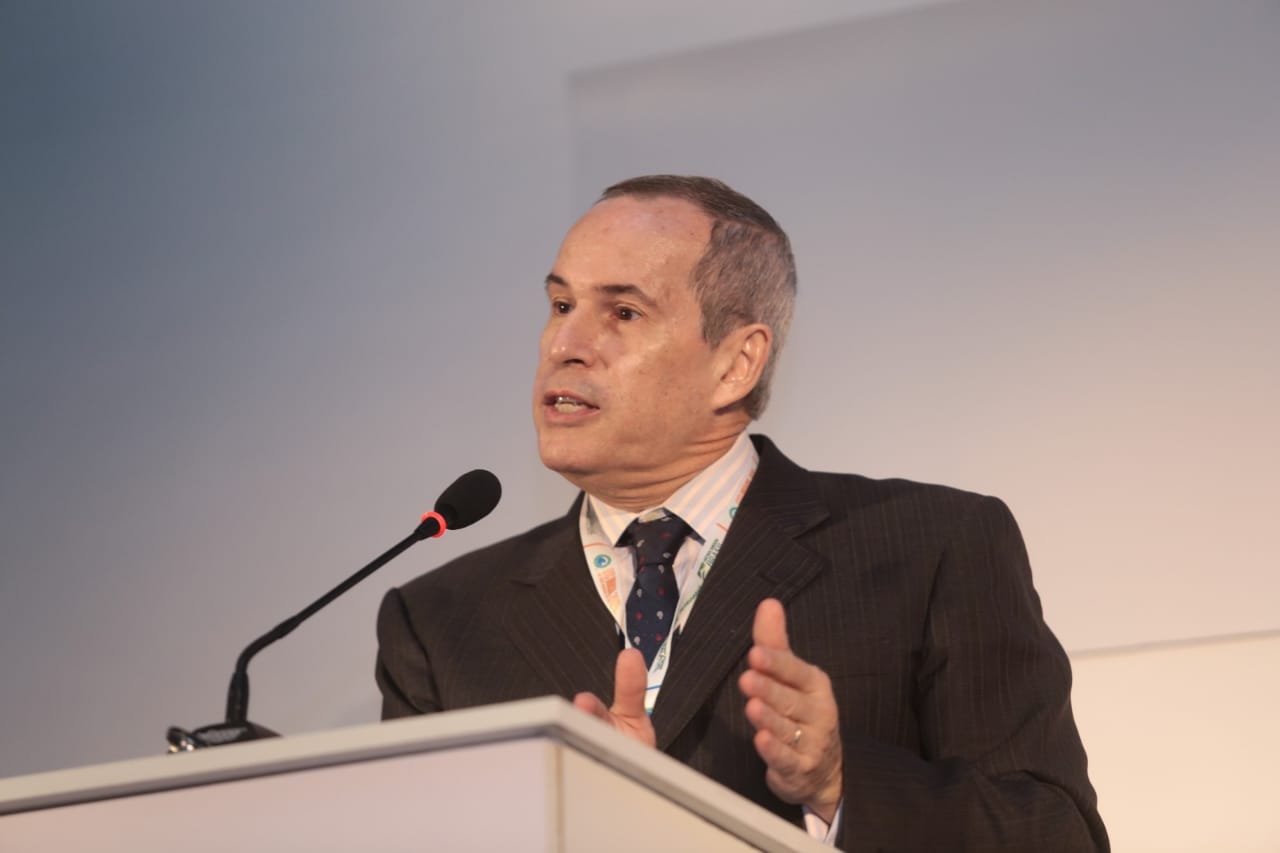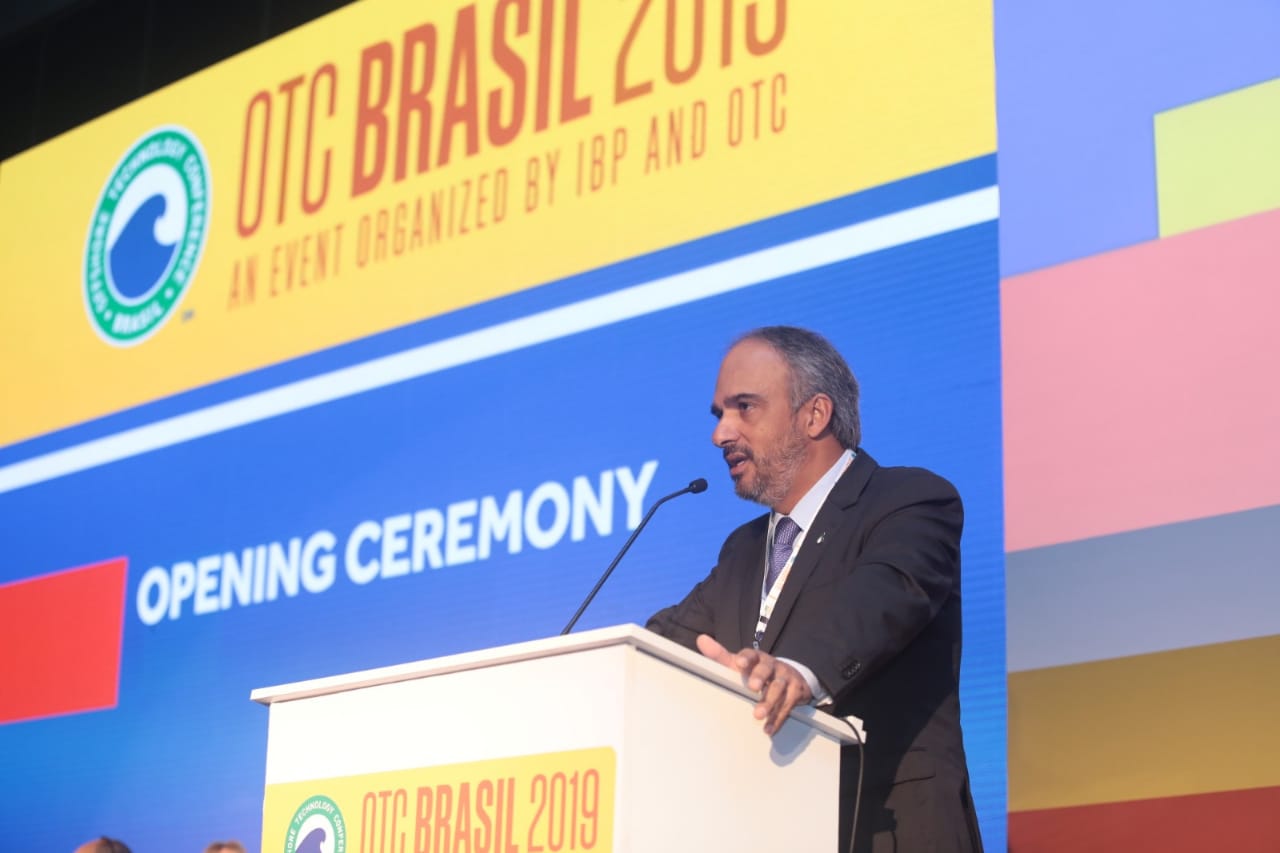OTC Brasil 2019 começa com boas notícias para o setor de O&G

Em auditório lotado para a abertura do evento, governo promete melhoria no ambiente de negócios, novas oportunidades de investimento e mais segurança no licenciamento ambiental
Representantes do governo e da indústria atribuíram o sucesso da OTC Brasil 2019,que começou hoje, no Centro de Convenções SulAmérica, no Rio de Janeiro, à reabertura do setor de óleo e gás a investimentos privados. Em um auditório lotado, a uma semana do leilão de excedente da cessão onerosa e da 16ª Rodada do Pré-sal, o governador do Rio de Janeiro, Wilson Witzel, e o ministro de Minas e Energia, Bento Albuquerque, não se limitaram, porém, a comemorar os feitos realizados até agora. Sinalizaram para abertura de novas fronteiras para exploração e produção de petróleo e gás e para a aprovação de medidas que melhorem ainda mais o ambiente de negócios no país.
“Não mediremos esforços dos nossos deputados e senadores para aprovar as reformas necessárias, como a tributária, que já está caminhando”, disse o governador, garantindo ainda que irá se empenhar “pessoalmente” para garantir a vigência integral do Repetro, o regime aduaneiro do setor que foi renovado em nível federal até 2040, mas que ainda é discutido na Assembleia Legislativa do estado. “O Rio de Janeiro precisa de um ambiente de negócios atrativos, por isso, o Repetro é um compromisso meu”, afirmou.
O ministro confirmou a abertura de novas fronteiras para exploração, em águas internacionais cuja conformação geológica, segundo ele, espelha a do pré-sal. Além do encerramento das licitações de áreas do ano, marcadas para semana que vem, Albuquerque também destacou a agenda de reformas no Congresso, como a recém-aprovada reforma da Previdência. “O Brasil é um lugar confiável e seguro para investimento. A indústria de óleo e gás prova que estamos do lado certo”, declarou.
Com a expectativa de receber mais de 15 mil pessoas nos três dias de evento, o presidente do Instituto Brasileiro de Petróleo, Gás e Biocombustíveis (IBP), José Firmo, iniciou sua fala frisando a melhoria da atratividade do país para a indústria global. “Nos últimos três anos, a melhoria da estrutura regulatória brasileira mostrou-se bem-sucedida e ajudou a abrir um ciclo virtuoso de competição e investimentos na indústria de petróleo e gás”, afirmou.
A OTC Brasil é organizada pelo IBP e pela Offshore Technology Conference (OTC). Para a chairman da OTC, Cindy Yeilding, o interesse pelo evento reflete a preocupação com o desenvolvimento do setor. “A presença no evento demonstra preocupação com a profissionalização da indústria”, disse a executiva, destacando o papel de mais de uma centena de voluntários na análise dos trabalhos técnicos que serão apresentados ao longo dos três dias de conferência.
O chairman da OTC Brasil, Marcos Assayag, responsável pela programação técnica desta quinta edição, destacou a importância do desenvolvimento tecnológico para a redução dos custos de exploração e produção de petróleo no mar, principalmente em águas profundas. Segundo ele, o lema do evento “Fortalecendo águas profundas para o futuro” resume essa preocupação. “O comitê organizador trabalhou por mais de um ano para entregar a melhor programação técnica”, frisou.
Segurança no licenciamento ambiental é próximo item da agenda regulatória, afirma ANP

Antes da abertura, no primeiro da série de três cafés da manhã com agentes do mercado na OTC Brasil 2019, o diretor geral da Agência Nacional do Petróleo, Gás e Biocombustíveis (ANP), Décio Oddone, afirmou que o próximo item da agenda regulatória do setor é o licenciamento ambiental. Segundo ele, medidas adotadas nos últimos anos resolveram a “atratividade regulatória” não apenas na exploração e produção, mas também no segmento de gás e refino, mas é importante resolver as incertezas que ainda existem na etapa de licenciamento e que têm limitado o desenvolvimento de importantes bacias na costa brasileira.
“A próxima agenda é resolver a questão ambiental. Difícil achar que está certo receber um bônus de assinatura, aprovar um plano de investimentos e depois não conseguir licença para explorar a área”, resumiu.
Para Décio, o equacionamento de questões regulatórias como ter a Petrobras como operador único do pré-sal, falta de regras para a unitização de campos e de calendário de rodadas ajudou a destravar a “atratividade geológica” que o Brasil sempre teve. “Fico feliz de ver que o esforço conjunto de muita gente foi capaz de resolver isso e que os investidores e não o governo são agora os protagonistas”, completou.
Indústria apoia governo nas ações de contenção de óleo no Nordeste

O presidente do IBP, José Firmo, destacou o apoio que a indústria vem dando ao governo para conter os danos causados pelo vazamento de óleo de origem ainda desconhecida no Nordeste do país.
De acordo com Firmo, o IBP e as empresas do setor estão trabalhando com o governo para conter os danos. Entre os esforços mencionados, está o envio de análises do óleo para França e Noruega, a distribuição de kits de segurança para os voluntários e a disponibilização de dados do banco de dados Mapeamento Ambiental para Resposta à Emergência no Mar (Marem), criado em 2016 em acordo da indústria com o Ibama, que possui informações de toda as praias do litoral brasileiro e localidades relevantes sob o ponto de vista ambiental.
As características do óleo e do vazamento, porém, limitaram até agora a eficácia das medidas. “Depois de mais de um mês, ainda existem incertezas, como sobre a trajetória do óleo e, ainda mais complexo, como gerenciar a segurança em operações fora da fronteira da legalidade, como parece ter sido a origem desse acidente”, afirmou.
As fotos do primeiro dia da OTC Brasil 2019 estão disponíveis aqui.
A OTC Brasil conta com o patrocínio da Petrobras, Equinor, ExxonMobil, Shell, BP, Chevron, Petrogal, Total, Repsol Sinopec, TechnipFMC, Vallourec, PetroRio, Aker Solutions, Frank’s International, Maha Energy Brasil, Shawcor, Solvay, Halliburton, Enauta e MOL.
Acompanha aqui a cobertura da OTC Brasil 2019: